Reviews
Mitchell Leisen
USA, 1941
Credits
Review by Jonathan Foltz
Posted on 02 March 2011
Source DivX
Categories Brackett & Wilder
“The department has a new theme song: ‘Is it love, or is it immigration?’”—Mr. Hammock, the immigration officer
Given the current profusion of politicized nostalgia for both the sanctity of marriage and the security of national borders, you would be forgiven for thinking that there is something intrinsically American about the sort of classic “man and wife” romance which used to be Hollywood’s bread and butter. The truth, of course, is that the old Hollywood films from which we derive the present narratives of “what the culture has lost” frequently expressed profound skepticism about the stories of love and nationalism they purported to tell. This is certainly the case with Hold Back the Dawn, the 1941 film written by Billy Wilder and Charles Brackett, and largely butchered onscreen by the direction of Mitchell Leisen. A film about an aspiring immigrant waiting for his visa who falls in love with an American schoolteacher, in a plot ostensibly designed to celebrate the twin American Dreams of love and liberty, Hold Back the Dawn is in fact remarkably ambivalent about the possibilities of felicitous union—both personal and political—that it proposes.
This ambivalence may in part reflect the aesthetic differences between Wilder (an Austrian émigré with leftist leanings) and Brackett (the wealthy son of a New York Senator, and a republican), who, despite their famous billing as the “happiest couple in Hollywood,” frequently clashed behind the scenes. The production of Hold Back the Dawn was by all reports more contentious than most, with the writers fighting openly with the film’s star, its director, the author of the novel on which it was based, as well as the Mexican government. The frustration caused by these creative differences is often cited as the impetus behind Wilder’s decision to take up directing himself the scripts that he produced with Brackett. And if Hold Back the Dawn doesn’t fully signal the kind of triumphs that would follow in its wake, it nevertheless demonstrates a surprising willingness to toy with, and even undermine, the narrative conventions upon which it would seem to rely.
The film sketches the abject life of a group of immigrants waiting patiently in the “Hotel Esperanza” for admission to the U.S. under the old quota system, which limited the number of immigrants based on the country in which they were born (and which bore the Orwellian tag “the National Origins Formula”). The fact that most of the film’s immigrants are from Germany, or from adjacent parts of Europe, is the film’s only acknowledgment of the war—a looming but determinative absence here. The real target is the bloated bureaucracy of an American system blind to the human cost of its seemingly arbitrary policies. The immigrants of the film are for the most part idealistic adherents of the American dream, despite being subject to its heartless exclusions. One family hosts a fourth of July party to celebrate U.S. independence, and quickly corrects the visiting immigrations officer, Mr. Hammock, who isn’t able to recall the words inscribed on the Statue of Liberty; another woman, desperate to have her child be born in America, risks her own health to slip over the border upon going into labor.
These peripheral stories would seem to suggest a traditionally liberalist affirmation of immigration as the heart of American identity, but the Hold Back the Dawn is not really interested in these forms of blatant political allegory. The protagonist of the film, Georges Iscovescu, is decidedly unlike his ardently democratic neighbors: a Romanian gigolo who has decided to enter the United States in order to follow the trail of wealthy women fleeing war in Europe, he remains bitter and scornful about the country he waits to enter. He refuses to attend the Independence Day celebration hosted by the kindly Prof. van den Luecken, and broods (understandably) that the “five to eight years” which he has been told to wait for admittance sounds distinctly “like a prison sentence.” In a final insult, he unloads his misanthropic views on a busload of American elementary school children, who have thrown their fireworks too close to his feet. When the charming schoolteacher, Emmy, tries to make the boy apologize, things go from bad to worse: “I think it would be better if they let off their high spirits in America,” Georges retorts, “under the feet of Americans!….You see, there is a fence back there! You Americans make a very definite point of it.” In her haste to drive the bus away, Emmy crashes into a parked car, and Georges leaves her there to retreat to the nearest bar. When he realizes that it is possible to obtain a Visa by marrying an American citizen—and that Emmy the schoolteacher would make an easy target—he apologizes, but then deliberately kicks a crucial engine part into the sewers, thus obliging her (and her bus of antic students) to stay overnight, thus giving him time to seduce her.
For a film ultimately invested in rehabilitating Georges’ character through his transformative love for Emmy, Hold Back the Dawn is surprisingly voluble in its bitterness out of the gate. Indeed, Brackett and Wilder deliberately reworked the original story (based on a novel by Ketti Frings), changing the main character from a noble prizefighter to Georges’ depraved seducer—a decision that nearly caused a lawsuit by Frings’ real husband, on whom the story was based. In striving to make Georges’ character a despicable rake, the film loses no opportunity to satirize the generic trappings of the traditional romance films that had made its heavily accented French star, Charles Boyer, famous in the first place. There is an evident glee in watching Georges concoct scenes of amorous sensitivity as he aims to woo a set of prospective wives. “You may think it was cold-blooded, calculating, the act of a cad perhaps,” he confides to the audience at one point, “But on second thought, I’m sure you’ll realize that my intentions were entirely honorable. Objective: matrimony.” Walking through the crowded stands in search of lonely, susceptible single women (“clay pigeons” to his “sharp shooter”), Georges succinctly captures the film’s deeply sardonic conflation of seduction and national feeling: “What do they call it, the pursuit of happiness?”
Still, if Brackett and Wilder’s script works best by turning its political skepticism into a dark comedy of unscrupulous romance, the film is hampered by a reluctance to fully embrace its acid humor. Indeed, Boyer’s performance is so mired in aristocratic seriousness that it fails to acknowledge the underlying irony written into the role. Boyer—who was then being touted in the press as “cinema’s No.1 love-maker”—evidently objected to playing a ridiculous, even contemptible character, and many of the film’s best lines are hopelessly garbled his attempt to maintain his signature urbane accent. (This is especially frustrating given Wilder’s flair for slang, which is present but muddied here: see the following year’s amazing Ball of Fire for a better example). Indeed, the most infamous scene in Hold Back the Dawn was never shot. Wilder had apparently devised a scene where Georges was to be alone and dejected in his hotel room, interrogating a cockroach walking up the wall, and asking, as if in impersonation of the immigration officers plaguing him, “Where are you going? What is the purpose of your trip? Let’s see your papers.” It’s easy to see why Wilder was proud of the scene, which would have quietly established a subtext of Kafkaesque anxiety and resentment early on in a film whose happy ending will soon seem inevitable. But Boyer refused to perform it, claiming that the scene demeaned him. When Leisen sided with his star, Wilder resolved to write Boyer out of the film as far as possible, giving added dialogue to his formidable costar, Olivia de Havilland.
While it’s easy to wish that Boyer had been written out of the film much more thoroughly, there’s no denying the captivating power of de Havilland’s performance as the innocent Emmy. In fact, Emmy’s simple grace in being seduced is so much more affecting than Georges’ staid clichés (“I have been watching your face, learning it like a poem,” etc.) that Boyer may have ended up looking more foolish in comparison. “Will you put the ring on my finger…and say the words?” de Havilland whispers as if the emissary of love’s mysterious intensities, “For richer, for poorer…for better, for worse…with this ring, I thee wed…till death do us part.” These words, too, are pure formula; but the look of reverent, bodily need on her face in this scene is the perhaps most effective argument imaginable for the sacred power of the rites of marriage…or at least for the transcendent beauty of its delusions. Even as Emmy’s protestations of love grow increasingly strained and symptomatic of Georges’ indifference, de Havilland’s performance utterly convinces us of her sincerity. Later, as Georges is driving her on a “honeymoon” designed to evade the attention of the immigration officer, Mr. Hammock, Emmy points clairvoyantly to the windshield wipers of the car driving off the rain, reading a destiny in their romantic synchronicity: “Together…together…together…” A few minutes later, she is passionately cradling a trio of olives, while coming up with names for her future children. From a distance, it’s easy to see the film’s ironies at work here, but de Havilland is utterly captivating in her emotional vulnerability, transcending the absurdity of her situation, while Boyer simply fails to rise to it.
The result is that Hold Back the Dawn is caught uncertainly between Brackett’s traditionalist romanticism and Wilder’s more anarchic sense of irony, leaving the audience uncertain as to whether or not the film is mocking its marriage plot or simply bungling its execution. Politically, though, the film retains some of its bite. Even a character as saintly as Emmy shows how the national idealization of immigration can work to rationalize its bureaucratic exclusions. In trying to explain the greatness of America to Georges while on their honeymoon, Emmy gets characteristically lyrical:
Emmy: “It’s like a lake, clear and fresh, and it’ll never get stagnant while new streams are flowing in.”
Georges: “Well, your people are building pretty high damns to stop those streams.”
Emmy: “Just to keep out the scum, Georges! Don’t you see?”
Hold Back the Dawn is not a coherent film by any means, but its strangely incongruent tonalities and sudden bursts of humor point to a different kind of film-making than the one it chiefly embodies. Indeed, singular moments are peppered throughout the film in joyful, absurdist one-liners (“I threw a bowl of chili right in his face and ran!” “I’m like a cucumber in an icebox! Feel my cheek!”). When Emmy asks the mechanic if her car has been fixed, he replies (infuriated with the mischievous schoolchildren) “Yes, she’s ready. But I wish I could fill her up with rattlesnakes!” When she responds that one of the children will be made to “go kneel in the corner” as punishment for his behavior, the mechanic pleads even further: “On broken glass, I beg of you! On broken glass, please!” The movie as a whole doesn’t quite live up to the alternating suggestions of glee and awe that it inspires in passing, and one is left to wonder what it could have been with a different performance in the lead. Still, the wit and irony of the script shine through the cracks, offering glimpses of what was to come.
More Brackett & Wilder
-
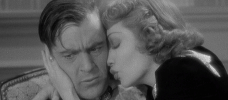
Bluebeard’s Eighth Wife
1938 -
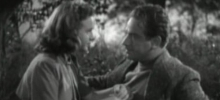
That Certain Age
1938 -

Midnight
1939 -
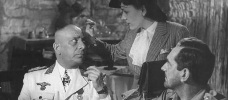
Five Graves to Cairo
1943 -
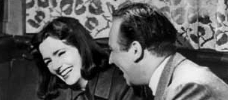
Ninotchka
1939 -
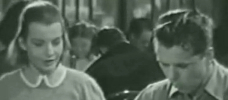
What a Life
1939 -
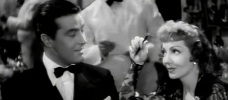
Arise My Love
1940 -
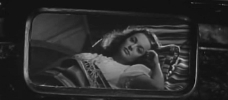
Hold Back the Dawn
1941 -
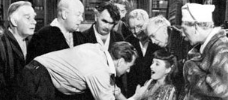
Ball of Fire
1941 -
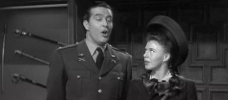
The Major and the Minor
1942 -
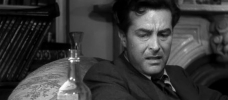
The Lost Weekend
1945 -
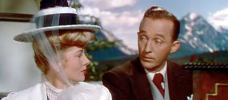
The Emperor Waltz
1948 -
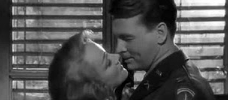
A Foreign Affair
1948 -
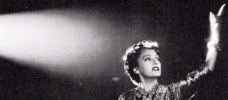
Sunset Boulevard
1950
We don’t do comments anymore, but you may contact us here or find us on Twitter or Facebook.



